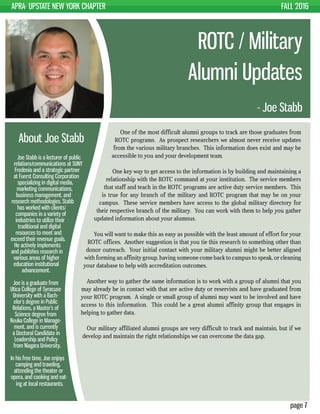jstabb-2016FallNewsletterAPRA-UNY
- 1. APRA- UPSTATE NEW YORK CHAPTER FALL 2016 newsletterAPRA-UNY Share The Knowledge Go to next page....
- 2. ROTC / Military Alumni Updates - Joe Stabb About Joe Stabb Joe Stabb is a lecturer of public relations/communications at SUNY Fredonia and a strategic partner at Fuerst Consulting Corporation specializing in digital media, marketing communications, business management, and research methodologies. Stabb has worked with clients/ companies in a variety of industries to utilize their traditional and digital resources to meet and exceed their revenue goals. He actively implements and publishes research in various areas of higher education institutional advancement. Joe is a graduate from Utica College of Syracuse University with a Bach- elorŌĆÖs degree in Public Relations, a MasterŌĆÖs of Science degree from Keuka College in Manage- ment, and is currently a Doctoral Candidate in Leadership and Policy from Niagara University. In his free time, Joe enjoys camping and traveling, attending the theater or opera, and cooking and eat- ing at local restaurants. One of the most difficult alumni groups to track are those graduates from ROTC programs. As prospect researchers we almost never receive updates from the various military branches. This information does exist and may be accessible to you and your development team. One key way to get access to the information is by building and maintaining a relationship with the ROTC command at your institution. The service members that staff and teach in the ROTC programs are active duty service members. This is true for any branch of the military and ROTC program that may be on your campus. These service members have access to the global military directory for their respective branch of the military. You can work with them to help you gather updated information about your alumnus. You will want to make this as easy as possible with the least amount of effort for your ROTC offices. Another suggestion is that you tie this research to something other than donor outreach. Your initial contact with your military alumni might be better aligned with forming an affinity group, having someone come back to campus to speak, or cleaning your database to help with accreditation outcomes. Another way to gather the same information is to work with a group of alumni that you may already be in contact with that are active duty or reservists and have graduated from your ROTC program. A single or small group of alumni may want to be involved and have access to this information. This could be a great alumni affinity group that engages in helping to gather data. Our military affiliated alumni groups are very difficult to track and maintain, but if we develop and maintain the right relationships we can overcome the data gap. page 7 APRA- UPSTATE NEW YORK CHAPTER FALL 2016


